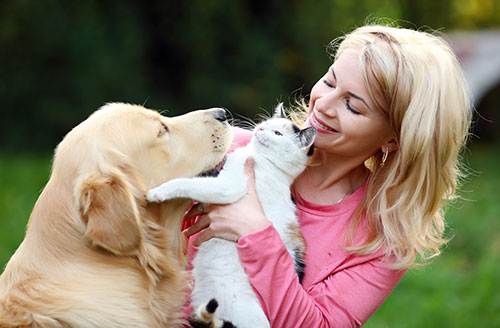While some parents shy away from even thinking about adopting a dog or cat, more than half of all U.S. households can tell you there are many good reasons to add a furry family member to your home.
Here are a few:
A pet a day helps keep the doctor away
- Children who grow up in homes with pets typically develop fewer allergies and asthma complications. According to the Journal of Pediatrics, kids who had a dog during their first year of life had 31% fewer respiratory tract infections than kids who didn't live with a dog. In fact, studies suggest that kids growing up in a home with “furry animals” will have less risk of allergies and asthma.*
- Family fitness: Kids with dogs tend to get outside more often. Whether they play with their pooch or take him for a walk, they get out of the house. That goes for pet parents, too. When you take your dog for a walk, you’re taking yourself for a walk, hence exercise. Petting a dog or cat can help lower blood pressure and stress by releasing oxytocin, a hormone which can suppress stress-causing hormones. The American Heart Association suggests that owning a dog may help support your heart health due to increased exercise, reduced stress and an overall healthier lifestyle.
- Petting a dog or cat may also increase levels of immunoglobulin A, an antibody that helps fight off the common cold.**
- According to general statistics, families with dogs or cats tend to require fewer doctor visits, and who wouldn’t want that?
Blues busters
Many studies show that people who interact with dogs and cats are less likely to suffer from depression. Furry family members offer loving companionship and bring structure to our lives.
Dogs, in particular, have a tendency to display unconditional love for their pet parents. After a long day working, who else meets you with a frenetic wagging tail at the door. Who else is as excited to see and spend time with you?
Dogs and cats also force us to have a routine. We have to take dogs outside for walks and bathroom breaks, we must feed our cats and dogs and be attentive to all of their needs. Simple, everyday routines structure our lives and can help keep the blues away when depression hits.
Gold stars for learning and socializing
- Feeding, walking and grooming a furry family member can instill nurturing and empathy skills in your child.
- Gradually assigning pet care tasks to younger children helps them learn the importance of accountability for their actions, especially when someone they love so much is depending on them.
- Therapy pets that visit schools can help children learn to read. When kids read aloud to dogs or cats, it helps nurture their love of reading.
- The Journal of Personality and Social Psychology claims children who grow up with dogs or cats have greater self-esteem and feel less lonely than people who didn’t have furry family members.
- Dogs or cats can make it easier for shy and socially awkward children to talk more and make new friends.
- Pets strengthen family ties and promote bonding, plus they help adults feel and behave like kids again!
Between the inexplicable joy that comes from snuggling with our four-legged friends, and the convenience of an energetic, in-house playmate for our children, there are many good reasons to answer the plea for a pet.





